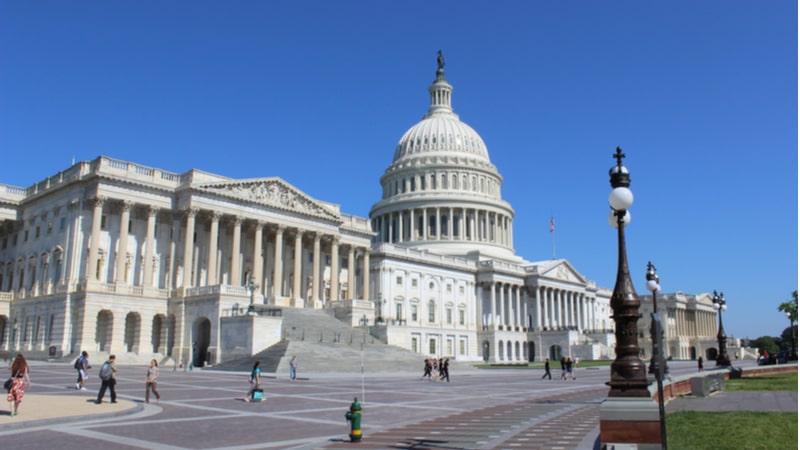
The complex legislative process needed to bring congressional leaders together to reconcile differences between Senate-passed and House-passed semiconductor and innovation legislation advanced in the Senate this week, and now stands just a few steps from completion, as lawmakers call for cybersecurity-related components of the bills to make the final cut.
Senate Majority Leader Chuck Schumer, D-N.Y., filed cloture March 23 on an amendment to replace the text of the House-passed America Creating Opportunities for Manufacturing, Pre-Eminence in Technology, and Economic Strength (COMPETES) Act with the text of the Senate-passed United States Innovation and Competition Act (USICA).
That action set up a vote for Monday, March 28, to officially swap in the USICA text. Having also filed cloture on the underlying legislation, the next step after that for the Senate would be to vote to pass the bill and send it back to the House.
And at that point, a small group of senators and House members could be called together for a conference committee session to work out any remaining differences in the two bills. If the conference committee succeeds in its work, then the resulting bill would be sent back to both the House and Senate for final votes.
“As convoluted as the Senate process often is, the bottom line is that the train is moving forward when it comes to this bill,” Sen. Schumer said on the Senate floor March 24. “A lot of senators from both parties have worked for years to see legislation like this reach the President’s desk.”
“If the United States is to thrive in the 21st century, we need to keep our competitive edge in science and innovation, and this bill would do just that,” he added. “We must continue growing American jobs. We must continue to lower the price of critical technologies, like semiconductors, and this bill would do just that as well.
“We have a few more steps to take before we reach a conference, but support of this bill is strong and bipartisan, and the process is moving forward.”
Lawmakers Call for Cyber Provisions to Make the Cut
As Congress moves closer to beginning the conferencing process, Sen. Angus King, I-Maine, and Rep. Mike Gallagher, R-Wis., called for the final bill to include cybersecurity measures that both USICA and America COMPETES share, as well as others contained in one bill or the other.
Sen. King and Rep. Gallagher, who co-chaired the Cyberspace Solarium Commission, sent a letter to Sen. Schumer and Senate Minority Leader Mitch McConnell, R-Ky., voicing their support for the $52 billion in CHIPS funding included in the bills, but said that the final bill should reflect the need for enhanced investment in the cyber workforce and the nation’s cyber posture as a whole.
“Congress has a critical opportunity to advance and secure U.S. global technological leadership for the 21st century,” King and Gallagher wrote. “In doing so, it must also invest in America’s cybersecurity and critical infrastructure resilience.”
Among that highlighted legislation is the Cybersecurity Opportunity Act, which would create a grant program to increase investment in cyber education at HBCUs and minority-serving institutions, as well as language that would create rotational learning opportunities for Federal cyber employees.
Additionally, the lawmakers called for the final inclusion of a measure to expand the ROTC-like CyberCorps program that is included in the America COMPETES bill. Other COMPETES provisions the pair argued for include designating Critical Technology Security Centers, and creating programs designed to build international cyber capacity for the U.S. and its allies.
As far as USICA cyber components the pair called to make the cut, they pointed to investments in regional technology hubs, as well as the creation of a National Risk Management Cycle. The latter represents a solution to a problem the Cyberspace Solarium Commission identified in its March 2020 report. The commission was then government-chartered but has since transitioned to a non-profit organization.
“In our March 2020 report, the Cyberspace Solarium Commission noted that the U.S. government ‘lacks a rigorous, codified, and routinely exercised process’ for identifying risk. By creating a National Risk Management Cycle, Congress would codify an essential capability for properly resourcing U.S. government efforts to deter threats and mitigate risks to critical infrastructure,” the letter says.
“The cyber threats facing our country have never been greater, and American technological leadership will depend significantly on our ability to defend against those threats and recover quickly from disruptions to critical infrastructure,” they wrote. “As such, we strongly urge that the provisions we have highlighted here be included in the final conferenced legislation that crosses President Biden’s desk later this year.”
The Senate vote to amend the America COMPETES legislation with the text of USICA, marking the next step in the process, is set for Monday, March 28 at 5:30 p.m.
